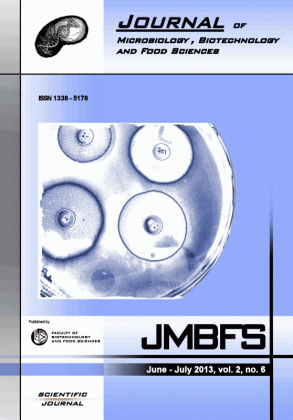CHANGES IN NUTRIENT AND ANTINUTRITIONAL CONTENTS OF SESAME SEEDS DURING FERMENTATION
Keywords:
Sesame seeds, fermentation, Antinutritional factors, mineral, protein, amino acidAbstract
Sesame seeds were fermented using the traditional method for four days and samples taken for analysis each day till the last day of fermentation to monitor the compositional changes in the seeds as fermentation progressed. The viable count obtained ranged from 8.0×103 after 24 h to 2.93×106 cfu/g on the 4th day. The crude protein and fat content increased as fermentation progressed reaching 27.84% and 51.58% respectively. Fermentation yielded positive effect on the phytic acid, phytin phosphorus and oxalate content of the flour samples when compared with the control. Phytic acid content ranged from 31.59 mg/g for raw seed to 18.13 mg/g for fermented seed flour. Sesame seed are high in minerals such as calcium, magnesium, potassium, sodium and slight increases in values were obtained at the end of processing. Sesame seeds are rich in both essential and non-essential amino acids with leucine, methionine, phenylalanine, threonine and valine values higher than the recommended daily allowance. Processing significantly increased the amino acid values. Sesame flour demonstrated ability to scavenge free radicals. Fermentation of sesame seeds resulted in reduction in the antinutrients in the seed and the seed can serve as soup condiment and seasoning with improved nutritional composition with respect to protein and amino acid.Downloads
Download data is not yet available.
Downloads
Published
2013-06-01
How to Cite
I. Olagunju, A., & O. T. Ifesan, B. (2013). CHANGES IN NUTRIENT AND ANTINUTRITIONAL CONTENTS OF SESAME SEEDS DURING FERMENTATION. Journal of Microbiology, Biotechnology and Food Sciences, 2(6), 2407–2410. Retrieved from https://office2.jmbfs.org/index.php/JMBFS/article/view/7093
Issue
Section
Food Sciences
License
Copyright (c) 2013 Aderonke I. Olagunju, Beatrice O. T. Ifesan

This work is licensed under a Creative Commons Attribution 4.0 International License.
All papers published in the Journal of Microbiology, Biotechnology and Food Sciences are published under a CC-BY licence (CC-BY 4.0). Published materials can be shared (copy and redistribute the material in any medium or format) and adapted (remix, transform, and build upon the material for any purpose, even commercially) with specifying the author(s).

